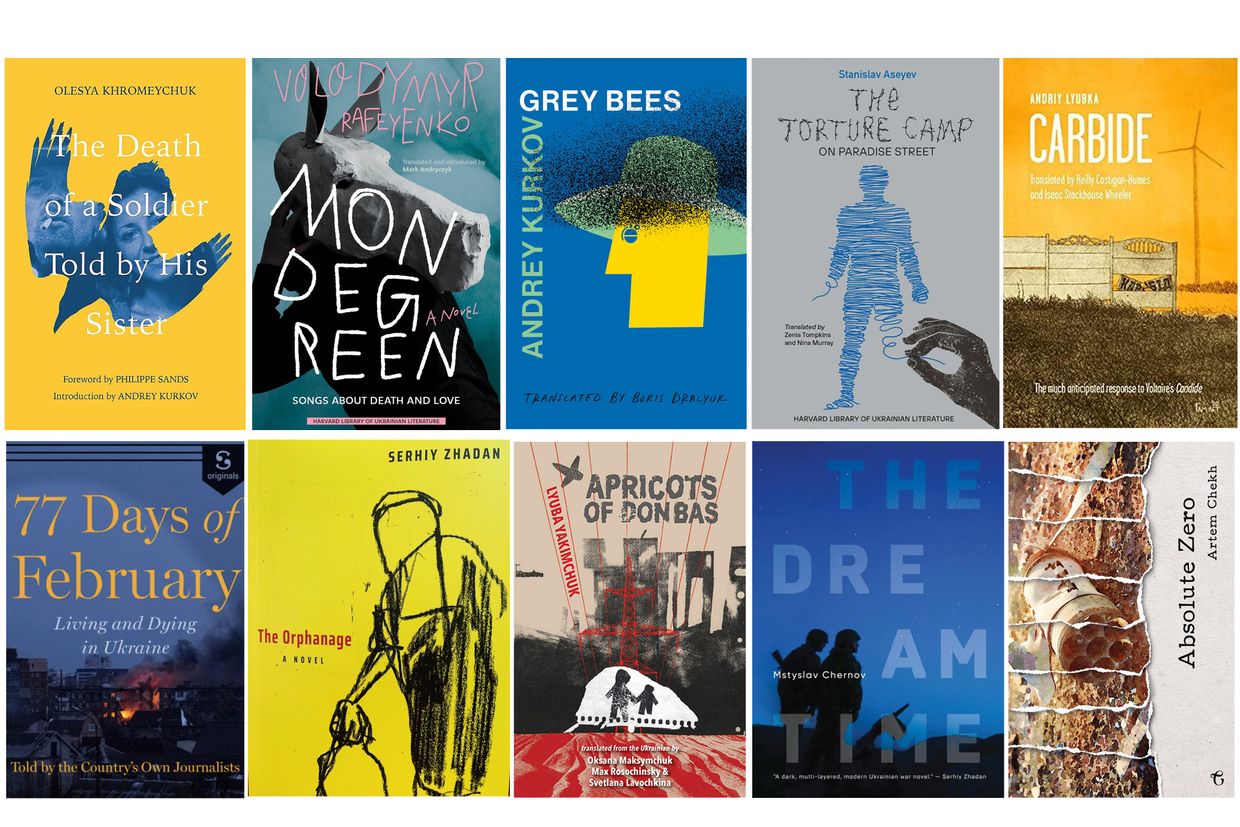‘No Country for Love’ examines the cost of survival for Ukrainians in past wars

Editor’s note: This story contains graphic descriptions.
The accounts of elderly Ukrainian civilians who survived the hardships of World War II in their youth, only to face the brutality of Russia’s full-scale invasion of Ukraine, underscore the cyclical nature of history’s relentless and unforgiving course.
It’s the tumult of the early 20th century in Ukraine and surrounding countries of the former Soviet Union — marked by revolutions, political purges, famine, and world wars — that offers a critical lens through which to understand this present war, the most brutal one Europe has seen since that era.
In that sense, historical fiction offers writers a unique ability to explore similar themes with the benefit of hindsight, inviting readers to reflect and draw parallels, perhaps even speculate on how Russia’s current war might look once it draws to a close.
“No Country for Love,” the debut novel of Ukrainian-born journalist Yaroslav Trofimov, follows Debora, a Jewish-Ukrainian woman who leaves her “sleepy hometown” of Uman in central Ukraine to contribute to the construction of the Kharkiv Tractor Plant in 1930. Although initially out of her element, she swiftly forms friendships, finds love with a charming pilot named Samuel, and acclimates to her new life in the city.
Kharkiv served as the capital of the Ukrainian Soviet Socialist Republic from 1919 to 1934. Trofimov is adept at portraying “the perpetual energy of the big city” and how, during that period, Kharkiv attracted people from all across Ukraine: “This was the metropolis of the future, a place where everything changed before your eyes, where every day brought something unexpected.”
While Debora and her friends savor their youthful optimism against the backdrop of Kharkiv’s modern allure, ominous, looming events threaten to disrupt their lives forever.
Kharkiv and its environs stood as the epicenter of some of the darkest moments of this historical period. The city’s intellectual elite were systematically targeted, their numbers dwindling as they were arrested, imprisoned, and, in many cases, executed by the Soviet secret police: “One by one, they started to vanish. At first their books were no longer displayed in the university shop, and no longer available in the library. Then the academics themselves stopped showing up for classes, and substitute instructors arrived to teach their courses.”
Trofimov's portrayal of the Holodomor — the man-made famine of 1932-1933 orchestrated by Joseph Stalin, which claimed the lives of an estimated 3.5 to 5 million Ukrainians — is chilling. He captures the desperation of some of the villagers who, in their search for sustenance, arrive in vain. City street cleaners complain about the discovery of yet another lifeless child among the corpses in the snowbanks. Eventually, movement throughout the region is restricted by the authorities, so the horrors of what is unfolding outside of the capital remain the topic of hushed conversations.
In contrast to typical Western-oriented stories set in the Soviet Union, “No Country for Love” offers the reader a more realistic portrayal by addressing the complex linguistic, cultural, and ethnic diversity often overlooked by other storytellers in favor of a simplified, reductive view of the region as being uniformly “Russian.”
Soviet history oscillated between periods of tolerating local cultures and enforcing Russification. As a result of the latter, languages like Ukrainian were relegated to "rural" status in the minds of many and deemed unworthy of use in metropolitan centers. Russification policies were part of the state’s efforts to centralize control under the guise of a more “unified” Soviet identity.
Yet, there still existed discrimination against non-Russians, with anti-Semitism standing out as a particularly glaring example in the novel. Derogatory slurs against Jewish people are commonly used in the aftermath of World War II, and societal issues are frequently attributed to them.
Debora, raised as an agnostic Jew by her father who believed that one of the “positive” aspects of the Bolshevik Revolution was that it had “swept away all these distinctions for ever,” is later compelled to change her name to Daryna and take a Russian surname. She reassures her young son by calling him a "Soviet man" after he is subjected to anti-Semitic slurs by other children. However, as the years pass, she is heartbroken to witness him adopting the same bullying behavior toward other Jewish boys, fully internalizing this identity.
This notion of a "unified" Soviet identity is fraught with internal dissonance, an identity so malleable and subjective that it can be twisted to mean anything, often in harmful ways. Trofimov cleverly underscores this ambiguity through passages that highlight the absurdity and contradictions inherent in the concept:
“(Debora’s) parents had taught her that Ukrainian was the tongue of uneducated peasants, just as Yiddish was the vernacular of backward shtetl Jews. Only the great Russian language, with its enlightened legacy of Pushkin, Dostoevsky and Tolstoy, was a gateway to the future, according to Debora’s father, who had memorized a few poems by Pushkin in high school but had read neither Dostoevsky nor Tolstoy.”
After witnessing the dark events that came to define the backdrop of her formative years in Kharkiv, Debora moves to Kyiv with her family, but the outbreak of World War II prevents them from realizing a happy future. As Debora, her young son, and her mother flee the Nazi advance on Kyiv, they find themselves in the expanses of Russia. In this setting, Trofimov astutely highlights some of the more pronounced differences that distinguish Ukrainians from Russians: “It was the first time that Debora had been in Russia proper, and she sensed the difference from Ukraine – in accents that stressed the long ‘a’, in clothes, in the rhythm of life. Locals, too, immediately put her down as a stranger.”
As the novel reveals through its characters’ interactions, war and political strife have the capacity to elicit both the noblest and the most nefarious aspects of human nature.
A once-flirtatious male acquaintance of Debora’s, upon ascending the ranks of the secret police, weaponizes his attraction to her and turns predatory, while jealous neighbors in communal living spaces seize the opportunity to spy and report on her and her family for even the slightest perceived indiscretions, condemning some of them to cruel fates.
Debora is repeatedly forced to sacrifice her own needs and desires over the years, making unimaginable choices to safeguard the lives of her children. Yet, Trofimov navigates such moments with a profound respect for his protagonist. Even during the novel’s bleakest scenes, nothing feels exploitative.
This careful and empathetic treatment reflects his extensive background as a journalist, where he has skillfully narrated the experiences of those in conflict zones with both nuance and sensitivity. His journalistic precision translates effortlessly into fiction, with each chapter unfolding like a meticulously crafted dispatch, devoid of any superfluous elements.
Among the most striking passages in “No Country for Love” are those depicting how people of all ages come to normalize war as a defining aspect of their daily lives, such as when children in the courtyard of Debora’s building play with shrapnel that fell from the sky during the Battle of Kyiv or how entire villages get wiped out by invading forces.
Among the most striking passages in “No Country for Love” are those depicting how people of all ages come to normalize war as a defining aspect of their daily lives.
These passages evoke parallels with Russia’s current war against Ukraine the most of all, underscoring how much trauma generations of Ukrainians have endured:
“Yet another depopulated Ukrainian village…would soon be overgrown by the forest, a few apple and cherry trees in the wilderness bearing witness to what it used to be long ago. A place where people once fell in love, where people celebrated their weddings, where they taught their children how to ride horses and milk cows. Before ambitions and ideologies and hatred in faraway capitals wiped it off the map.”
At its core, “No Country for Love” is an exploration of survival and its costs. In the face of pervasive suffering and death, the notion of returning to one’s previous way of life becomes untenable, rendering survival a subjective concept.
Characters like Debora, who seeks only love and a fulfilling life for her children, emerge deeply disillusioned, acutely aware of what the years have wrought upon her. The novel leaves the reader to answer the question of whether or not true love and happiness can ever be found amid the remnants of such profound hardship.
“We are up against history. History is a wild and bloodthirsty animal,” as Debora’s mother explains to her at one point in the novel. “It is on a rampage through this country again, breaking and remaking it anew.”
“You can’t stand in its way, and you can’t stop it. All you can hope is that it misses you as it lashes out and claws its way forward.”
Note from the author:
Hi, this is Kate Tsurkan, thanks for reading this article. There is an ever-increasing amount of books about Ukraine available to English-language readers, and I hope my recommendations prove useful when it comes to your next trip to the bookstore. Ukrainian culture has taken on an even more important meaning during wartime, so if you like reading about this sort of thing, please consider supporting The Kyiv Independent.















